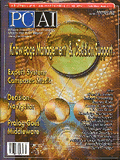|
Features
|
| The Knowledge Navigator: An Auction Metaphor for the Brokering of Corporate
Knowledge Assets Earl Cox examines a knowledge management system, incorporating
an expertise repository and adaptive feedback to rate of the expert's knowledge
and abilities, thus bridging the gap between those with knowledge and those
in need. |
| Distributed (Indexed) Searching: Evolution of XML Elizabeth Thede
describes how using XML as an interchange medium results in more intelligent
searching of local and remote servers. |
| Prolog Goes Middleware: Java-based Embedding of Logic Servers Thomas
Steiner illustrates the use of a Prolog engine to integrate and distribute
a logic base within two popular middleware architectures: RMI and CORBA. |
| AI@Work Pillbury revolutionizes its business by mining data to
understand consumer tastes using web-based intelligence. |
| Expert System Composes Music: AI Creativity William L. Pirkle illustrates
a rule-based expert system that utilizes chaos to create art, in the form
of music. |
| Decision Navigator: An Enterprise Decision Support System Don Creswell
discusses an approach for measuring and managing the crucial strategic decision-making
process. |
| The Next Wave of Knowledge Management: Opportunities to Leverage Knowledge
through People, Process, and Technology Daniel W. Rasmus accesses the
technology that facilitates the exchange of knoweldge and ideas among the
extended base of employees, customers and partners. |
| Regression Analysis: A Brief Look at the History of AI Ilana Marks
explores the evolution of AI technology over the past 50 years and offers
a glimpse of what we may see in the future. |
|
|
This is an exciting time for the computer industry and particularly
for the field of AI. Decades ago, when the excitement over AI and expert
systems was just emerging (for the 2nd time - see A Look at the History
of AI), computers were too underpowered and information too isolated
for AI to reach its full potential. Today, not only are computers sufficiently
robust but understanding of AI technologies and development environments
has also matured. In addition, today's Internet and intranets readily supply
the facts and raw data for the AI technologies to process. The product of
this data and information processing is raw Knowledge, for which AI can
again supply the technology to simplify and amplify its usage - Knowledge
Management (see Knowledge Navigator and The Next Wave of Knowledge
Management). |
| |
As you read this editorial, the movie "AI" will
be playing in theaters near you. The star of this movie, a robot, exhibits
a number of human-like characteristics. Although the field of AI is still
quite distant from "AI's" human behaviors (see AI and the Movies),
we are starting to see pieces of this big AI puzzle come together. Possibly
less glamorous technologies, such as fuzzy logc, expert systems, natural
language processing and robotics, already handle narrow portions of this
overall vision (visit the vendors mentioned in this issue for examples).
In addition, web sites such as www.kurzweilai.net are attempting to demonstrate
larger pieces of that puzzle. Here you will find Ramona, an example of a
human machine interface, exhibiting human-like characteristics, some narrow
domain knowledge and even a hint of personality. |
| |
One human characteristic that traditional AI systems are missing
is creativity. In general, when you develop a system to solve a problem,
it is important that the solution be repeatable. That is in contrast to
the creative notion. One article in this issue (Expert System Composes
Music) explores AI technology, in the form of an expert system, as a
means of composing music. Another very human characteristic apparently solved
in the movie but still challenging real world developers, is the issue of
self-awareness. Possibly an even tougher test for AI than the Turing Test
- If you build it, will it care? Will it even know? |
| |
AI has been hitting the news recently from NASA's AI in satellites,
to bots, to "Business Intelligence" being selected by analysts
as one of the top five technologies for the future. Searching news and technology
information sites for terms such as "artificial intelligence"
is uncovering a major increase in interest. With the current depressed economy
and tight budgets, companies are foregoing their usual hardware upgrades
and attempting to do more with less - causing an increased interest in intelligent
software. In addition to large databases and knowledge bases requiring knoweldge
management to maintain their knowledge, they need to be able to find information,
i.e. intelligent searches (see Distributed Searching). Even if a
company has the knoweldge readily available, it often goes unused by key
corporate managers making the strategic decisions. For corporations to utilize
this knowledge to improve corporate intelligence and define a successful
corporate strategy, intelligent technologies such as decision support can
be useful (see Decision Navigator). |
| |
There is so much to cover in this growing field and it is
changing so rapidly. I hope that this issue provides you with a glimpse
into this exciting world. |
| |
|
| |
Terry Hengl |
